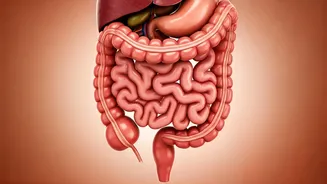Embrace the Basics
Focusing on what we eat is a fundamental step toward preventing colon cancer. Making simple changes in the foods we choose can have a significant impact
on our health. This article highlights four food groups with the potential to significantly decrease the risk of this serious disease. It is important to remember that diet is not the only factor, but it is one of the most accessible and controllable aspects of maintaining good health. By incorporating these items into your daily meals, you can take a proactive step towards a healthier lifestyle and proactively protect your body.
Fiber-Rich Wonders
Fiber, often found in plant-based foods, is a key element in colon health. It aids digestion and helps move waste through the colon. Including foods like whole grains, fruits, and vegetables in your diet is recommended. For example, oatmeal at breakfast, a salad with lunch, or a serving of fruits as a snack can enhance fiber intake. The recommended daily intake of fiber for adults is around 25-30 grams. Increasing fiber consumption gradually is important to avoid digestive discomfort. Make sure to drink plenty of water as you boost your fiber intake to facilitate smooth digestion and maximize the benefits.
Cruciferous Powerhouses
Vegetables belonging to the cruciferous family, such as broccoli, cauliflower, kale, and cabbage, are packed with nutrients that might combat colon cancer. These vegetables contain compounds like glucosinolates, which convert into cancer-fighting substances during digestion. Incorporating them into your diet is a straightforward process. You could add steamed broccoli to your dinner, enjoy a kale salad for lunch, or add cauliflower to your meals. To get the best benefits, try different ways of cooking these vegetables – steaming, roasting, or lightly sautéing – to maximize the retention of beneficial nutrients and diversify your diet.
Beans and Legumes
Beans and legumes are excellent sources of both fiber and protein. They also contain resistant starch, which feeds beneficial gut bacteria, leading to a healthier colon environment. Examples include lentils, chickpeas, black beans, and kidney beans. Incorporating beans and legumes into your diet is easy. You can add them to soups, stews, salads, or even prepare them as a side dish. Start with small servings and increase them gradually to avoid any digestive issues. They are not only nutritious but also economical and versatile, offering various ways to include them in your everyday meals.
Probiotic-Rich Foods
Probiotics, or beneficial bacteria, are vital for maintaining a healthy gut. Foods high in probiotics, like yogurt, kefir, and fermented vegetables such as kimchi and sauerkraut, can help keep the colon environment balanced and potentially reduce the risk of cancer. Including these foods in your diet can be as simple as adding yogurt to your breakfast or snacking on a small portion of kimchi. When selecting probiotic-rich foods, try to choose options that have live and active cultures. Remember, incorporating these foods regularly can help nurture a healthy gut and contribute to overall colon health.












